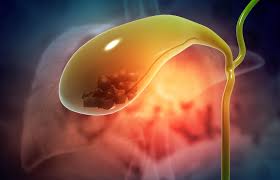

Gallbladder cancer is a rare form of cancer that often doesn’t cause signs or symptoms in the early stages. You’re more at risk of gallbladder cancer if you have conditions like gallstones or gallbladder inflammation. Most cases aren’t caught until it has spread and the prognosis is poor. Treatments include surgery, chemotherapy and radiation.
Gallbladder cancer begins in the innermost layer of your gallbladder, called the mucosal layer, and spreads outward. It often doesn’t cause signs or symptoms in the early stages. Instead, healthcare providers often find the cancer by chance after gallbladder surgery.
Gallbladder cancer is difficult to detect because symptoms don’t show up in the early stages. When symptoms appear, they’re similar to more common conditions, like gallstones or a blockage in a bile duct.
Cancer staging allows your healthcare provider to determine whether cancer has spread (metastasized) beyond its original (primary) location. To determine the extent of cancer spread, your provider will assign a number (zero through four) to your cancer. The higher the number, the more the cancer has spread throughout your body.
The cancer stage affects treatment and treatment goals. With early-stage cancers, the goal is often to remove the cancer, so it doesn’t return. If it’s more advanced, treatment goals may include extending your life and managing symptoms.
Early-stage gallbladder cancer that your provider can remove through surgery has the best treatment outcomes.
You may be eligible to take part in a clinical trial. A clinical trial is a study that tests new treatments and new approaches to current treatments. Current treatments for gallbladder cancer being tested in clinical trials include:
Targeted therapy: Treatment that targets cancer cells that carry certain gene mutations.
Immunotherapy: Treatment that bolsters your immune system so it’s better able to identify and destroy cancer cells.
Radiosensitizers: Treatment that makes cancer cells more sensitive to the effects of radiation therapy.
Gallbladder cancer can’t be prevented. You can do your best to avoid risk factors of gallbladder cancer. For example, you can work with your healthcare provider to maintain a healthy weight for you. Still, there’s no guarantee that your actions will prevent gallbladder cancer.

BEST ONCOLOGIST IN NOIDA
Enquire Now